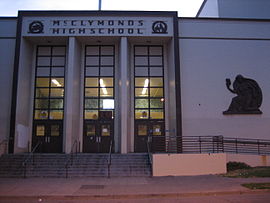Oakland Unified: Fremont, McClymonds and Castlemont Will Not Be Turned into Charter Schools
Mar 22, 2015
Posted in Education/Schools/Youth

By Ken Epstein
The Oakland Unified School District (OUSD) has announced that by a March 12 deadline, it has received letters of intent to design proposals for four schools that are part of the district’s intensive support school initiative, and none of these letters have come from a charter school.
The district said in a press release that it has received multiple letters from site-based volunteer committees: one letter from Castlemont High, one from Fremont High, one from McClymonds High and three letters from Frick Middle.
As a result, none of these of four schools will be become a charter school next school year as a result of the district’s Request for Proposals. The timeline for the fifth school facing redesign, Brookfield Elementary, has yet to be announced
Proposals for the four schools must be submitted by May 21 to a District Academic Review Board and the superintendent.
“We are gratified to learn that these four schools will continue to be public schools,” said Trish Gorham, president of the teachers’ union, the Oakland Education Association (OEA). “We don’t know what’s going to happen with Brookfield yet.”

The OEA, as well as numbers of students and community members vociferously objected at school board meetings and school site meetings to the district redesign process, which had allowed charter schools as well as school-site committees to run the schools.
A number of the community groups and students were not so much “anti-charter” as opposed to a takeover of their schools by outside organizations that they said knew nothing about them or their schools.
While a number of people are mystified by the opposition to charters, over the years many students and families already have had their schools closed or turned into charters. Some neighborhoods have no nearby public schools left to attend.
Charter schools have been growing dramatically in Oakland, especially since the takeover by the district by the State of California in 2003
According to the district website, there are currently 33 charter schools functioning in OUSD authorized by the district and six charter schools in Oakland authorized by Alameda County Office of Education.
Some of the charters are in located in their own buildings, some are in closed Oakland schools, and others share buildings with existing public schools.
For next school year, the district is looking at a K-8 charter school on the Castlemont High campus, which will be operated by Youth Uprising alongside the public school. There is also already another charter on the Castlemont campus: Leadership Public Schools: R&D.
In addition, there is a proposed Francophone Charter Academy at the Toler Heights campus: American Indian Charter School 6-8, which would share a campus with Bella Vista Elementary; and American Indian Charter School II K-8, which would operate at Edward Shands in East Oakland, which was closed when the school district largely abandoned its Adult Education courses.
These school sites have been offered under terms of state law, know as Prop. 39, but not all have accepted yet.
“Charter schools rob a city, its schools and its community of the will to support a common good for all. They foster an attitude that, ‘I’ve got mine, you take care of yours,’ said OEA President Gorham.
“With public schools, we have a obligation to work for the public good, and we have public oversight of the process,” she said. “There is no adequate monitoring of the charter school system, and the charters often do not serve students who are English Learners or have special needs. Harder to teach students are often counseled out of the school.”
When charters were begun years ago, she said, they were “bottom up” initiatives that were creative and innovative, and some of them still are,” she said.
But, increasingly, charters have become a business that operate at a corporate level – supported by some for profit motives and others because of the desire to reduce government support of most public services, she said.
School districts lose funding to charter schools, and charter employees have no job security or union rights, said Gorham.